
14 minute read
PBS Equipment
A personal approach
DOSER FREIGHT FORWARDING’S PERSONALISED APPROACH TO BUSINESS IS ONE THAT GELS PERFECTLY WITH VAWDREY AUSTRALIA.
High productivity Vawdrey drop deck Titeliner combination. In 1965, family business Doser Freight began operating as a privately-owned long distance transport company based in Adelaide. Now in its 54th year of operation, the company has branched interstate without losing its personal touch with customers. Company founder, Brian Doser, recently retired at the end of 2018, with son Adam Doser continuing to operate the family business after making a brief emigration to Western Australia before returning in 2005. Adam says his return to the family business was sparked out of a need for a greater work/life balance. “I just love the flexibility and being able to spend more time with family,” Adam says. The growth of the company has been steady, utilising a range of equipment from open bed flat trailers to Vawdrey Titeliners, standard and drop deck floors and pantechs. “We run a combination of A and B, 22-pallet trailers and 12-pallet (shorter) trailers with mezz decks,” says Doser Freight Director, Adam Doser. “The A trailers have a 140 cubic metre capacity at around 34 tonnes.” Having recently purchased new sets of Vawdrey drop deck Titeliner trailers, Adam praised their tare weight in tandem with their light, but strong construction. A perfect combination for fuel consumption, weight distribution and ensuring compliance across Australia’s extensive road and bridge network. It is no coincidence to see then that Vawdrey Australia is now leading the way in the design and manufacture of hightech equipment under the PerformanceBased Standards (PBS) high productivity scheme. As a family-orientated business, the personalised approach is also important with Doser Freight’s business partners. Adam cites his working relationship with Vawdrey as the key ingredient in the

Vawdrey’s trailing equipment is bolstering supply chain resilience.
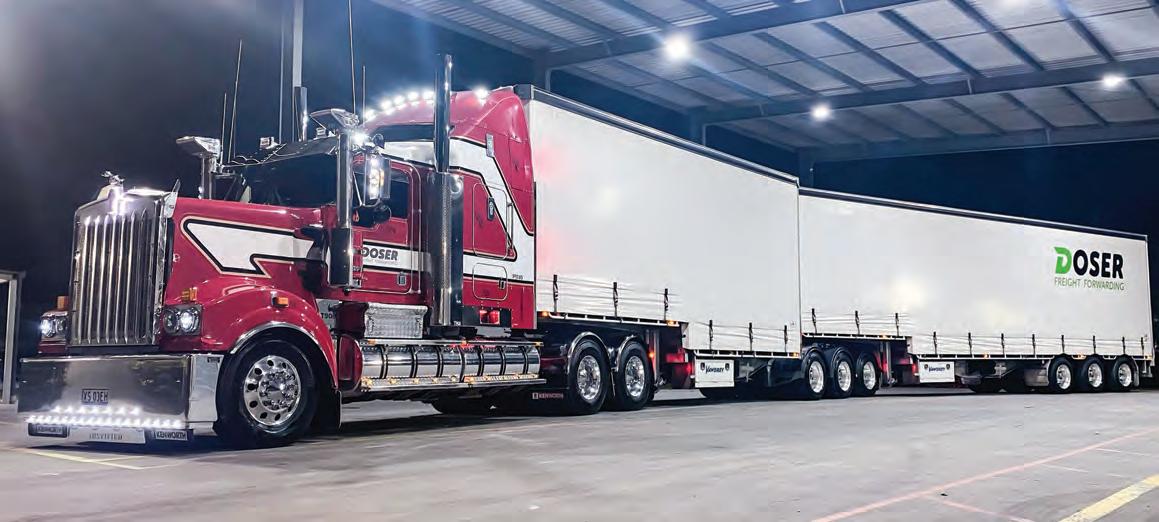
accord between the two companies. Initially focused on food and beverage logistics, Doser Freight is acutely aware that the industry demands special attention to detail and understands the stringent standards required throughout a reliable and seamless supply chain to ensure optimum temperature and condition. “That’s why all our trailers run on air ride suspensions to ensure a smooth ride for all goods,” Adam says. This approach has seen the company expand its logistics support from food and beverage to medical supply. “We do a bit of everything,” Adam says. Although while his company may have an ‘all-rounder’ status, its approach is nothing short of specialist. Doser Freight even specialises in Category A substance transportation. Supply chains in a postCovid-19 world will require resilient systems and processes combined with reliability and transparency throughout every step of the process. The global pandemic has been a marked test for business and industry, but probably none more than the entertainment industry – reporting some of the sharpest revenue declines. As exhibition and entertainment specialists, Doser Freight beared witness to the flow-on effects across entertainment ancillary industries. “We engage in exhibition supply from Adelaide to Darwin,” Adam says. “Entertainment has been hit hard, all the way through to the supply of beer to pubs. But it is starting to come back.” Notwithstanding the hurdle of Covid-19, Doser Freight has expanded its portfolio and managed to generate extra work during the pandemic. Adam points out that this year has been decidedly busier than 2020 thanks to landing a contract with DHL – one he has been chasing for three years. It is no surprise to see that partnership and productivity are inextricably linked, as the partnership between Vawdrey Australia and Doser Freight continues to show.
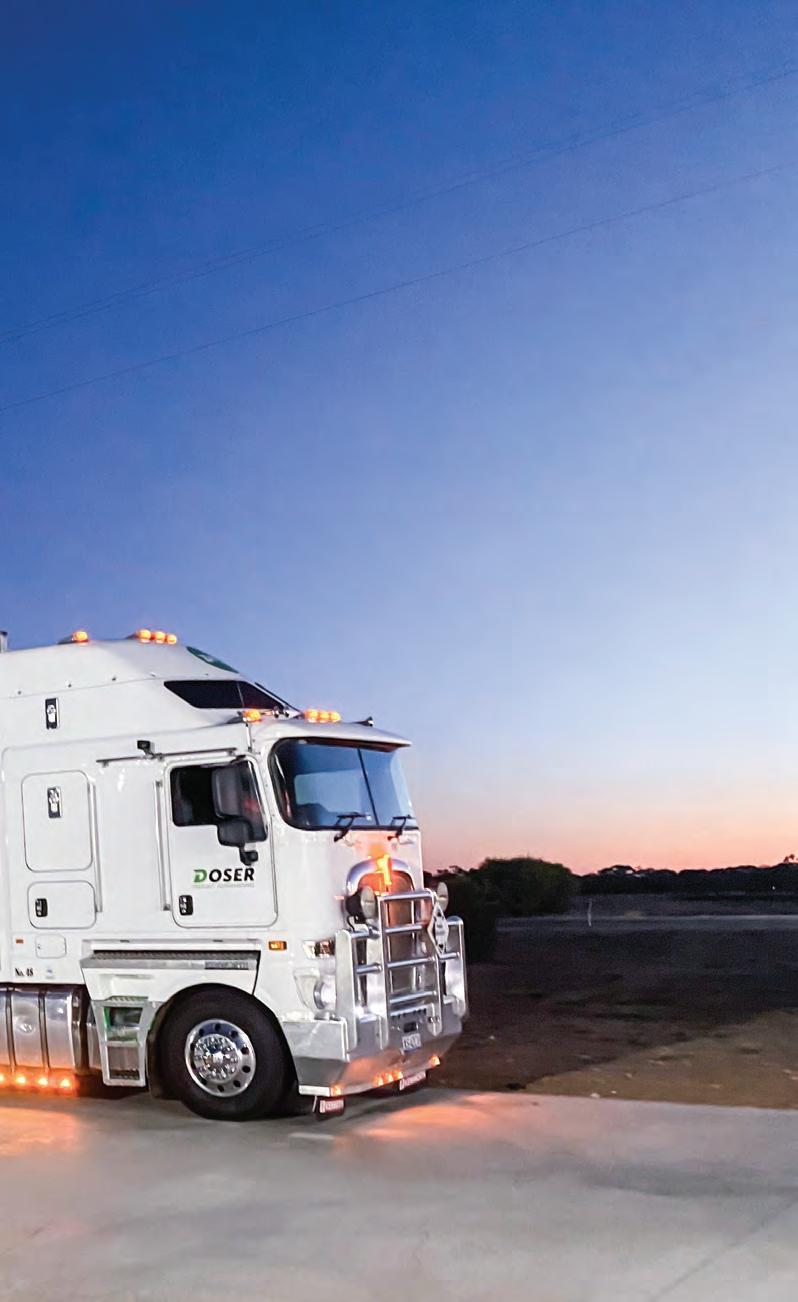
Contact
Vawdrey Australia 1-53 Quantum Close Dandenong South Vic 3175 Ph: 03 9797 3700 Web: www.vawdrey.com.au
Progressing PerformanceBased Standards
MARCUS COLEMAN, MANAGING DIRECTOR OF ENGINEERING FIRM, TIGER SPIDER, REFLECTS ON THE YEAR THAT WAS 2021.
Tiger Spider has developed award winning Software Hevi Spec for PBS design and assessment and Spider Path for swept path analysis using high resolution Nearmaps.

To kick-off the 2021 Brisbane Truck Show, Tiger Spider was presented with a product innovation award from the Heavy Vehicle Industry Association (HVIA) at National Transport Insurance’s swanky new office. The team was thrilled to get recognition for all their hard work. We launched our Nearmap plugin at the truck show and have since integrated other high resolution map image layers for road agencies. It’s great to know that Spider Path is helping road mangers develop Performance-Based Standards (PBS) networks and make quicker road access decisions. But technology moves fast these days and we’re in the process of a redeveloping our software with a focus on improving the user experience and providing more integration with other services like the National Heavy Vehicle Regulator (NHVR) portal. Over the past 12 months, we’ve been engaging regularly with the NHVR digital products team and providing input into the PBS submission channel and digitalisation of approvals. In the future we can expect to see dynamic routing of vehicles with networks automatically generated for a specific vehicle based on their size weight and performance characteristics. The Department of State Growth in Tasmania is leading the way, building a system that will hopefully be emulated across the country. Tasmania already has an automated mapping system for special purpose vehicles and is well on the way developing the same for PBS combinations that will include dynamic swept path and bridge assessments. While the first half of 2021 was plagued with PBS processing delays, a National PBS Tier 1 Notice was released in October meaning that PBS combinations no longer require permits to operate at Tier 1 masses. It’s a positive step forward but the notice doesn’t bode well for national consistency with an absent Queensland and a very different approach to PBS networks in each state. In May, Australian Transport Ministers accepted the NHVR proposal to move to a generic PBS tyre promising to remove a longstanding pain point. The current system had to be simplified so that operators didn’t have to deal with the complication and cost of managing PBS Approvals with specific tyres. We’re still waiting on the technical details to be released to understand what the proposed changes will mean for truck and trailer design, but suspect the change could incentivise smaller tyres to lower centre of gravity height as they do in New Zealand. Another positive is that 700 kilometres of routes have been approved to streamline the PBS access process for A-doubles and other reference combinations in Victoria. The Department of Transport Victoria is promising more quad-axle semi-trailers, B-triple and 113.5-tonne AB-triple reference vehicles along with a notice which will reduce the need for permits and give more certainty for PBS combinations in Victoria. Unfortunately, sustained resistance from the rail industry and bridge engineers to combinations over 26m and 68.5 tonnes has slowed the rollout of PBS networks. It has become apparent that heavy vehicle access across rail level crossings and bridges are being driven by Australian Standards AS 5100 Bridge Design and AS 7658 Level Crossings – Rail Industry Requirements. More than ever the world is driven by technical standards developed by engineers with deep subject matter expertise in increasingly narrower disciplines. Crypto and blockchain are the new frontier and at their core are protocols which automate execution of rules to maintain order over their domain. Ethereum and other layer 1 blockchains like Polkadot, Cardano and Algorand are standards upon which new technology and innovations can be developed, like non-fungible tokens, decentralised autonomous organisations and interoperability across the metaverse. In the future blockchain will hopefully be used to automate and decentralise
the PBS approval process. Drawing on the crypto analogy, PBS can be thought of as a layer-2 protocol, built upon more fundamental regulations and standards which facilitates new heavy vehicle innovations to be developed. It’s therefore important to be engaged in the development of the standards referenced by PBS. For fundamental change, the layer-1 protocols underpinning PBS need to be reformed. Brendan Coleman has been representing Tiger Spider on the ME53 working group reviewing how coupling D-ratings are calculated and the load factors that should apply to different vehicle types. The proliferation of PBS combinations and different drawbar and coupling types has meant that coupling ratings, which were not originally part of PBS, are now specified on all PBS design approvals. As a member of the SAE Truck and Bus Tire Committee we’ve just completed a review of SAE J2429 Free-Rolling Cornering Test for Truck and Bus Tires which until now, has been an important standard informally referenced by PBS. But the standards indirectly impacting PBS don’t stop at tyres and couplings. The ARTC has started requiring safety officers to be posted on a level crossing before an A-double could pass based on their interpretation of AS 7658 requirements. Unbeknownst to most in in the industry, the NHVR and state road managers have been negotiating behind the scenes with the ARTC and state rail regulators to resolve level crossing issues. Similarly, on the back of an interpretation of AS 5100, the Australian Bridge Design Standards DOTV released a ‘Volumetric (liquids only)’ A-double network which permits bulk tankers up to 11 tonnes more than a tipper, curtainsider or skel with identical axle spacings. Politicians and operators could be forgiven for not fully understanding the implications and complexity of the technical standards which will ultimately dictate PBS policy. Engaging on these matters requires a significant level subject matter expertise and is therefore a task undertaken by those dedicated to excellence in their field, who see a problem with the rules and set about the slow and often thankless process of fixing them. For PBS to flourish into the future it’s important to identify and understand the underpinning standards and ensure they are not putting unnecessary constraints on productivity and innovation.
Contact
Tiger Spider Suite 105-106/181 St. Kilda Road St. Kilda VIC 3182 Ph: 03 9537 1027 Web: tigerspider.com.au
HVIA CEO, Todd Hacking, Tiger Spider Product Manager, Justine Lorenz-Daniel, Tiger Spider Managing Director, Marcus Coleman, The Drake Group Managing Director and HVIA President, John Drake, and National Transport Insurance CEO, Tony Clark.

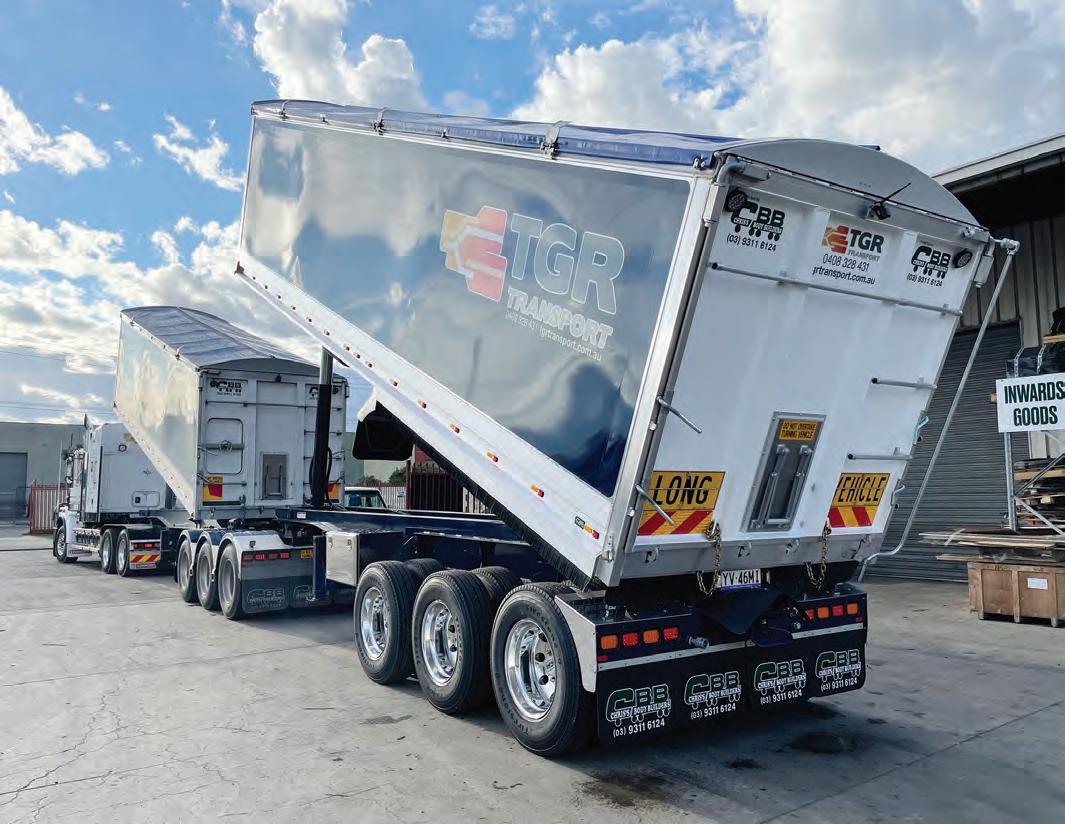
Making lightweight bulk tippers with York and SAF
FOR MORE THAN A DECADE, MELBOURNE-BASED CHRIS’S BODY BUILDERS CONTINUES TO BUILD PREMIUM BULK HAULAGE SOLUTIONS USING SAF AND YORK PRODUCTS.
The team at Chris’s Body Builders (CBB) is finalising a special bulk tipper order for a local transport business. CBB has been in the industry for over 38 years and has specialised in tipping equipment in the heavy transport industry. Its range includes tipping dog trailers, tipping semis, tipping sliders, converter dollies and PBS vehicles. This range covers a variety of different industries from grain to civil and construction using materials like Hardox and aluminium to build a superior quality Australian product. To uphold that quality the team at Chris’s Body Builders has partnered with SAF Holland/York as its goto suspension for tipping equipment in the heavy transport industry. CBB manufactures a range of trailer sizes and accommodates variations in suspension, axles, brakes and accessories. One of the brands that the CBB team often turns to is SAF-Holland for its SAF and York range of suspensions and axles. “SAF-Holland have been a key supplier for us for over a decade,” says CBB CEO, Chris Debono. “They’re a very reliable brand that offers a premium product and they have a pretty good reputation in the industry because of this.Their commitment to providing an excellent product has resulted in something that is very durable and lightweight. Their customer service has been great, too.
“When it comes to SAF products, the SAF Intra drum and Intra disc suspensions are chosen by our customers for their reliability, durability, ease of maintenance and weight-saving.” SAF’s suspension range includes the Intra family that is available with disc or drum brakes, and the Modul range of solutions that can be tailor-made for individual business needs. The Intra features a lightweight, fabricated trailing arm, rigidly connected or welded to the axle. The functional suspension arm and axle tube form an inseparable and maintenance-free unit. This eliminates the need for U-bolts, clamping plates and nuts. The shock absorber is protected due to its position in the functional suspension arm and the entire design is extremely robust and light for PBS applications. Its patented Safe-Guard design of the functional suspension arm protects the brake cylinder from damage. The Intra range also offers long-term conservation of value and functional safety through sophisticated cathodic dip coating with optimum corrosion protection. Meanwhile, the Modul is a modular suspension system for custom designed solutions from 7-14 tonnes. The SAF Modul system is highly versatile. With options such as a trailing arm under the axle, a cranked trailing arm over the axle, a trailing arm over the axle, and an extended suspension arm tolerance, customers can get an optimal suspension system for any transport tasks. SAF-Holland is continuously engaged in technological advancements to make its products more efficient and reliable, and even more suitable for purpose-built applications. SAF-Holland has also been offering greater choice and flexibility for customers with its York axles and suspensions since 2018. York axles remain CBB’s go-to option for most tipper trailers. York offers a range of options from round and square beam axles in 11-20 tonne capacity, to self-steer axles that are designed to improve tyre life, productivity, fuel consumption and manoeuvrability, to high-efficiency disc brake axles that offer increased braking response, ease of maintenance and outperform drum brakes, to heavy-duty axles that offer high load capacity up to 17.5 tonnes for mining and logging operation. “York is a reliable, economic solution to getting axles on your trailer and it has been a staple here at CBB for the last 15 years,” Chris says. “The CBB lightweight trailers and chassis paired with the reliability of York and SAF gives a very durable offering to the market. By having those two brands we’re giving the operators a premium solution to cart bulk freight and bulk transport.”
Contact
SAF-Holland Australia P: 1300 131 613 W: www.safholland.com.au
Chris’s Body Builders enhances its trailer builds with equipment from SAF-Holland.
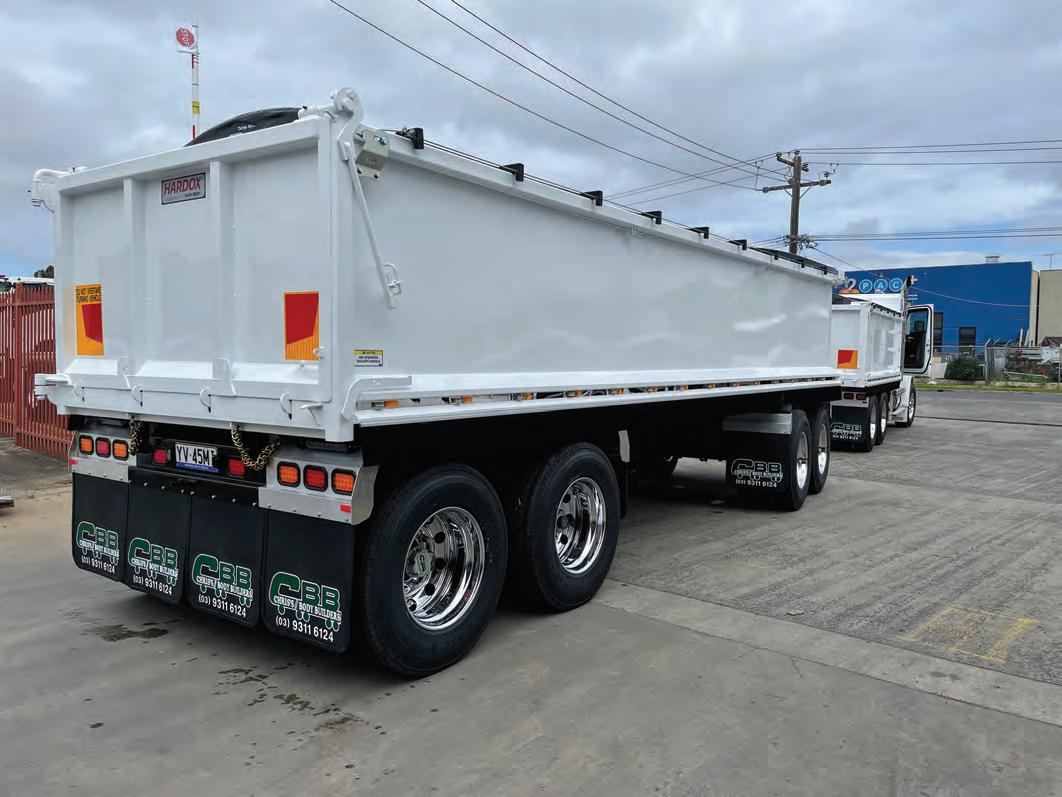
Piave Concrete has a five-axle Bulk Transport Equipment dog trailer that runs 68.5 tonnes under Performance-Based Standards.
Concrete plans

RECORD LEVEL INVESTMENTS IN MELBOURNE’S INFRASTRUCTURE HAS PLACED CONSIDERABLE DEMAND ON THE MANY SUPPLIERS THAT SERVICE THIS BUSY SECTOR. FOR PIAVE CONCRETE, TO STAY AHEAD IN THE GAME, IT SPECIFIES PURPOSE-BUILT AND HIGH PRODUCTIVITY VEHICLES FROM BULK TRANSPORT EQUIPMENT.
Fast Fact
Bulk Transport Equipment builds high quality custom tippers and special purpose trailers for a range of industries including the bulk haulage sector. The Piave story started in the 1950s when Northern Italian migrant, Gilberto ‘Beppi’ Crema, who along with his cousins, set up a small terrazo business in St Kilda, Victoria. As the years went by, this business broadened its portfolio to include concrete, formwork and construction and developed lasting relationships with clients. In time, the firm pioneered in-situ, tilt-up and precast construction and grew to take on larger industrial and commercial projects. By the 1990s, Crema established Piave Concrete – a major supplier of premix concrete for Melbourne’s burgeoning building industry and it continues to grow from strength to strength. The firm has a central presence in Port Melbourne with its own batching plant along with other strategically located facilities to maintain a competitive edge in the market. Committed to investing in high productivity solutions across its fleet, Maurice Moffa, General Manager at Piave Concrete, has taken delivery of a T909 Kenworth prime mover with pusher axle and a five-axle Bulk Transport Equipment (BTE) dog trailer running 68.5 tonnes under Performance-Based Standards (PBS). The rigid body is 20-metres-cubed and can carry 17 tonnes while the trailer carrying the remainder can manage 30 tonnes.
When compared to a conventional rigid and six-axle dog running at the same weights, BTE says the truck carries about 5.5 tonnes less, so you have a larger dog trailer carrying the extra payload. Maurice specified this combination because there was considerably more weight in the trailer compared to the truck when looking at a six-axle dog. “Essentially, we wanted to get more weight up front while still carrying the maximum payload,” he says – adding the call to run the combinations like this was not taken lightly as in his experience it is more cost effective to run a 6x4 truck and six-axle dog trailer on the road. However, Piave Concrete decided to run 8x4 and five-axle dog in the interests of having a closer payload ratio between the two vehicles. “The quality of the builds from BTE are great,” Maurice says. “We expect to get the most out of our trailers.”

Piave Concrete turns to Bulk Transport Equipment for high productivity solutions. Six-axle dog trailer.
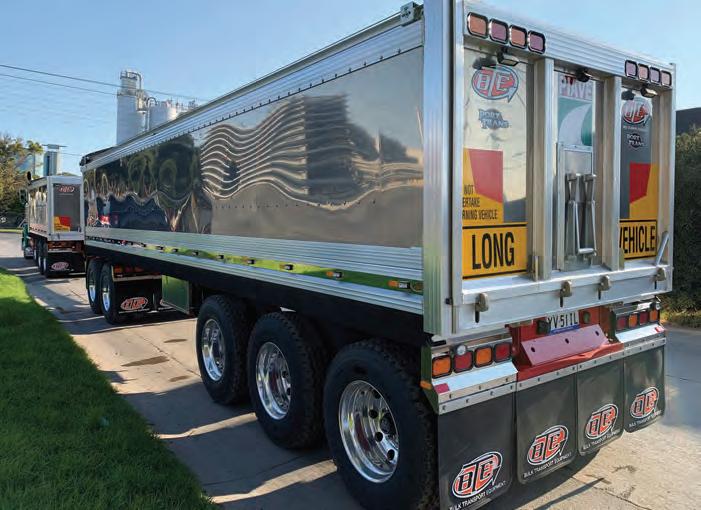
Contact
Bulk Transport Equipment 12-16 Fowler Road Dandenong South VIC 3175 Ph: 03 9794 0330 Web: www.bte.net.au









